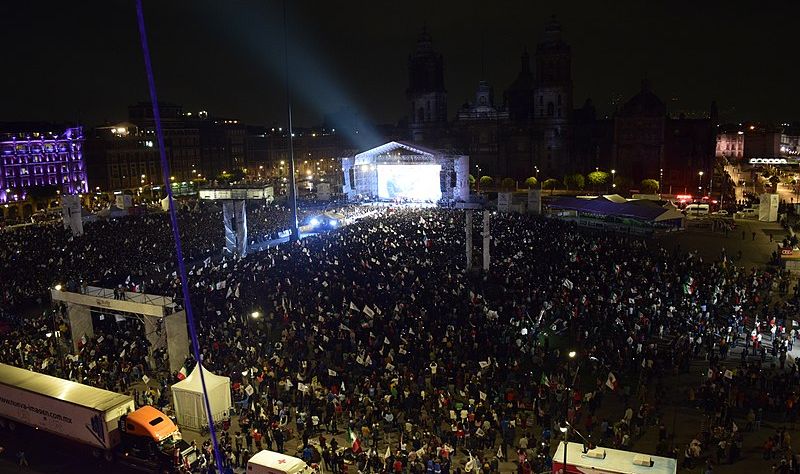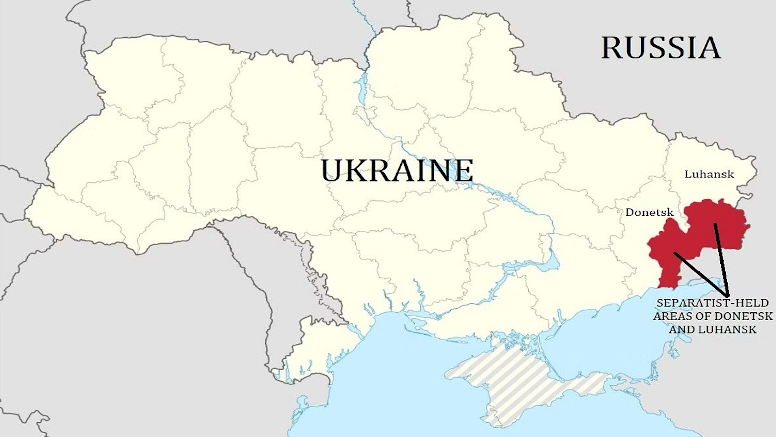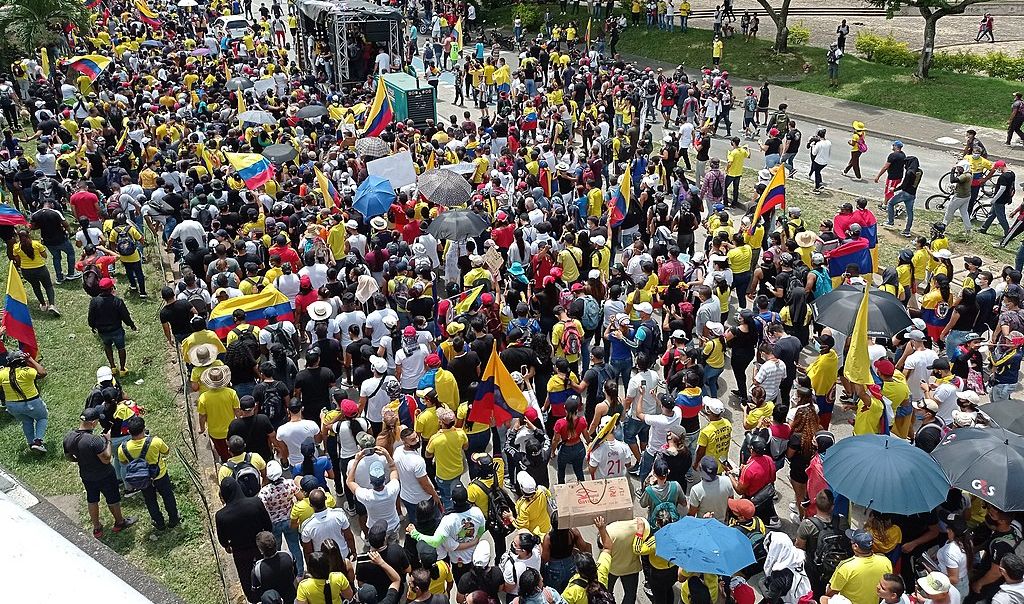Josafat Arrieta and Christian Tello are members of Alternativa Socialista (ISA in Mexico).
On 1 December, it will be two years since Andres Manuel Lopez Obrador (AMLO) took power. The overwhelming victory of the Movement for National Regeneration (Morena) on July 1, 2018 came as a result of years of growing misery for the majority of the population. A result also of frustration, at the repression carried out by the PRI and PAN governments against popular struggles, at state crimes like the Acteal massacre or the disappearance of students in Ayotzinapa, at the wave of violence unleashed by a false war against drug trafficking and at the neoliberal policies that impoverished the people of Mexico for the benefit of a few.
The victory of Andrés Manuel López Obrador in 2018 has brought about a change in the political situation of the country that has been governed by the right for more than thirty years. In fact, in Mexico there has not been a leftist president since the government of Lazaro Cardenas in the 1930s. Therefore, the country is undergoing a change, which Obrador’s government has called the “Fourth Transformation” (4T), one that in some way continues the three previous great transformations in Mexican history: Independence (1821), the “Reform war” of 1858 and the Mexican Revolution (1910–1920).
No one doubts that today, despite their mishaps, Andrés Manuel and Morena have important popular support. In the eyes of the majority, they continue to represent the hope for a national transformation that places special emphasis on helping the most disadvantaged sectors of the population, those who for decades have been forgotten.
However, it is very important to ask ourselves: how much progress has been made in building a different reality for the working class and the oppressed in Mexico? To what extent can Obradorismo carry out the profound change it proposes? These questions arise naturally when analysing the achievements and, especially, those aspects where the AMLO-led government has fallen short in its action. In particular when it comes to understanding that, at bottom, the project of Andrés Manuel and Obradorismo proposes a break with the worst excesses of neoliberalism, but not with capitalism itself. That is to say, to diminish social inequality, but not to eliminate the conditions that generate it.
The Fourth Transformation and the Bourgeoisie
AMLO’s victory in 2018 must be understood as the result of a social discontent that found in Obradorismo an alternative for the hotbed that was Mexico after more than thirty years of neoliberal governments. But at the same time it must be clear that an important factor in making this possible was the rapprochement of a considerable sector of the Mexican bourgeoisie to the project presented by Morena. It is sufficient to point out the example of Alfonso Romo, a multimillionaire who is now head of the Office of the President, or that of Esteban Moctezuma Barragán, who was President of the Corporate Fundación Azteca and now Secretary of Public Education.
It is true that the support of some businessmen such as Carlos Slim, the richest man in Mexico, was nothing new. However, the 2018 election showed that, unlike the 2006 and 2012 processes, names such as Azcarraga or Salinas Pliego were not on the list of those who openly positioned themselves against the possibility of a leftist president in Mexico. These businessmen have even been included in the President’s Business Advisory Council and their companies have benefited from contracts with the current administration, such as the contract for the broadcast of the “Learn at Home II” classes on television.
The above is proof of a distancing between part of the bourgeoisie and the neoliberal right, which can be explained by the lack of a solid, credible project on the part of candidates of the right wing PAN and the PRI parties. This was taken advantage of by AMLO, who decided to adopt a less confrontational attitude with the big national capitalists. The appointment of people like Alfonso Romo as Chief of the Office of the President, Manuel Barlett as General Director of the Federal Commission of Electricity, Esteban Moctezuma as Secretary of Public Education, or Victor Manuel Villalobos as Secretary of Agriculture and Rural Development, are proof of AMLO’s intention to have people in his cabinet that generate some confidence among the country’s businessmen. This despite the background and agenda of these characters, who will continue to push Obrador and the 4T in the direction of their own capitalist class interests and not those of the majority of the population who voted against them.
It is also clear that, despite some disagreements, the Mexican president has maintained a certain closeness with the Business Coordinating Council (CCE) and its president, Carlos Salazar Lomelin — the same CCE, which in 2006, promoted the campaign against Obrador titled “A danger for Mexico”. This sector of the bosses has played a very active role in planning some projects, like the reform of the pension system, which was announced in July of this year, and which was presented as a gain for the workers, but which is very far from actually benefiting them.
Despite this rapprochement and reconciliation, the relationship between the bourgeoisie has not been a smooth process. Since the presidential campaign, the sectors grouped in the Employers’ Confederation of the Mexican Republic, closer to the neoliberal right, have maintained a continuous and constant confrontation with the Federal Government. Issues such as the cancellation of the NAICM airport construction project and the Constellations Brand brewery in Mexicali, and the controversial Mayan Train project have been the most visible faces of this conflict.
Likewise, the presence in the cabinet of the names mentioned has caused clashes between the left-wing of Obradorismo and other progressive sectors of society and those who have positioned themselves in favor of the project more out of convenience than conviction. The constant friction between the now ex-head of the Department of Environment and Natural Resources (Semarnat), Victor Manuel Toledo, with Alfonso Romo and Victor Manuel Villalobos, which led to Toledo’s – who is linked with Morena’s more progressive wing – departure from the presidential cabinet at the end of August, is the most evident product of the contradictions of the 4T, a movement that has ended up bringing together antagonistic sectors and interests that clash with each other.
The proximity of AMLO and Morena to these business sectors can be a pragmatic strategy that, for the moment, may translate into good electoral results and a bearable relationship between the bourgeoisie and the federal government. However, these ties can be the main chain that holds back the 4T, if it seeks to take another step forward in the program that it claims to defend, further to the left.
An example of this is the opposition of big business to the defense of energy sovereignty proposed by this government and to some projects oriented from an ecological perspective. As Rosa Luxemburg explains in “Reform or Revolution,” reformism will always come up against the limits that the bourgeoisie imposes on it, and that makes it impossible to deepen real and lasting change for the working class by these means.
Let us not be confused. The sectors of the bourgeoisie that today support the 4T do not do so because they are in favour of a real transformation for the benefit of the working class, nor because they are true “patriots.” These sectors have supported Obradorismo for a simple reason: today Morena is in power, and if they want to maintain their privileges or increase their profits, they must be with whoever sits in the presidential chair. The capitalists will always be on the side that represents the greatest profits and will try to limit any advances that benefit the oppressed.
The elections in the United States will undoubtedly play a fundamental role in Mexico’s political situation. While it is true that Trump imposed a certain international agenda with Mexico, and AMLO partially benefited from Trump’s cordial treatment of him, deep down Biden’s triumph will not represent a real change for AMLO’s project. In other words, we are unlikely to see major tensions in the coming period between AMLO and whoever finally becomes president of the United States.
This is explained by the policy of the “good neighbor,” because in spite of AMLO’s nationalist policy, he does not intend to push anti-imperialist policies like Hugo Chávez or Evo Morales did for example, despite their own real limitations. Of course, this does not mean that contradictions will not grow.
For a Regroupment of the Anti-Capitalist Left. Let’s Build a Revolutionary Program
The avalanche that shook the country on July 1st, 2018, revealed a phenomenon that had been in the making for some time. The neoliberal right wing, grouped together in the PAN and the PRI, has been paralyzed ever since. Today the right-wing opposition is in disarray and is incapable of renewing itself and presenting an alternative project that can compete with Obradorismo.
As a result of the above, the most active opposition to some decisions and projects of the administration has come from the anti-capitalist left and the indigenous peoples. However, in spite of being the most consistent opposing force, it has not sought to bring together a bloc that is capable of pushing the process of transformation more to the left and therefore remains isolated in its localities without becoming a factor at a national level. In addition, their refusal to build a bridge with the rank and file and the more left-wing elements of the workers’ movement has led to its isolation, making it an easy prey for the right wing and the agent provocateurs who seek to use it to confront the Obrador government.
Of course we support the small advances that the Fourth Transformation may offer, but we consider that the closeness of the Obradorismo to broad sectors of the bourgeoisie and the presence in the project of elements of the right wing are the main limitations that can prevent it from achieving the ambitious objective it has set itself.
That is why we recognize the task of building an anti-capitalist left bloc. An anti-capitalist left that while remaining critical of the steps to the right within the 4T, also recognizes any steps forward, however small they may be, and pushes for their deepening. The construction of such a left must be a priority for all organizations that believe in a future where it is the working class, and not big capital, that imposes its will.
We are therefore convinced that it is necessary to put aside sectarian or personalised disputes, and work on the construction of a program that encompasses the demands of the working class, the peasantry and the indigenous peoples. Only with this unified program will we be able to consolidate a force that represents an alternative capable of pushing forward a process of transformation when Obradorismo hits the walls of Mexican capitalism.
In the face of the serious economic crisis that will hit the world and whose effects will be felt most strongly in countries like Mexico, these tasks take on even greater relevance. Only with an organization that concentrates the strength of the working class and with the elaboration of a program that allows us to link whatever gains are made during the six-year presidency with the deepest demands of the working class, will we be able to achieve new conquests and advance towards our final objective, the conquest of power by the proletariat.
However, this will not be a spontaneous result. The elaboration of concrete demands or slogans, as well as the struggle for their implementation, is central to promoting and developing these forces into forces with broad mass support. One of those slogans, in our opinion, is the promotion of a progressive fiscal reform that taxes the millionaire fortunes in order to finance programs and measures against the economic crisis that will soon devastate the country. Proclaiming Taxes on the Rich! is not merely a slogan, since it is part of a much broader program that seeks to improve the lives of workers. We must be aware of the importance of a tax on 1% of the population, whose wealth is eight times greater than the 62 million people (47%) who are the poorest in the country.
An example in this area is the victory of the #TaxAmazon movement in Seattle, USA. The mobilization of the workers of this city in support of the initiative achieved an important victory against Jeff Bezos, the richest man in the history of humanity, and other important capitalists by imposing a tax that will raise $48 million annually and will be used for housing and education programs focused on the most vulnerable sectors of the population.
Along with this demand, it is necessary to fight for:
- The nationalization of the pension system, which will contribute to the national coffers and put an end to the benefits of the private ones (AFORES)
- Re-nationalization of the energy sector and other strategic sectors of the economy.
- An increase in the minimum wage that recovers the capacity for consumption lost in the thirty years of wage contraction of neoliberalism.
- A shift to an approach that prioritizes care for the environment before the profits of the capitalists
- The fight against the serious problem of male violence against women in our country, through an information campaign against it and a purge of the judicial system that favors and encourages such violence with its impunity.
Through mass struggle and pressure from below it is possible to win some of these demands in this period, but we have to be clear that they cannot be secured under capitalism. The bourgeoisie takes away with the right hand what it gives with the left hand. These represent only one part of the program that we must build, the workers, youth, women, peasants, indigenous people and all the oppressed in general, in order to advance in the construction of an organization that really defends our class interests. The conquests that have been put forward, and those that will emerge in the class struggle in the coming period, can only be secured through the struggle for the socialist transformation of society.
But for the latter to be possible, the unity and organization of the working class and peasantry is fundamental. So is the coordination of the different struggles that today occupy the streets, which need to link their concrete demands with those of other struggles by outlining a broader programmatic horizon aimed at the radical transformation of society. We have a world to win and that world is possible, but we can only triumph if we are organized as a class and fight for victory. We support the need for a Fourth Transformation, but we are aware that, in the current context, it can only be socialist, ecological and feminist. Let us build that alternative.




